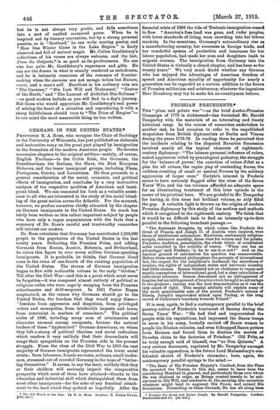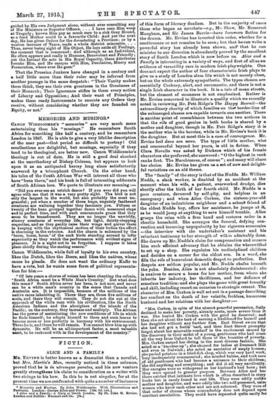PRUSSIAN PRECEDENTS.*
THE "plum and potato war"—as the brief Austro-Prussian Campaign of 1778 is nicknamed—has furnished Mr. Harold Temperley with the materials of an interesting and timely historical essay. In the comae of researches undertaken to another end, he had occasion to refer to the unpublished despatches from British diplomatists at Berlin and Vienna during the years 1776-79. In reading them he perceived that the incidents relating to the disputed Bavarian Succession involved nearly all the typical elements of eighteenth- century diplomacy "The intense personal influence of rulers, naked aggression veiled by genealogical pedantry, the struggle for the 'balance of power,' the assertion of raison &Etat as a plea for all crimes, the rapier play of contending forces, the ruthless crushing of small or neutral Powers by the military aggression of larger ones." Carlyle's interest in Frederic seems to have seriously flagged after the close of the Seven Years' War, and his ten volumes afforded no adequate space for an illuminating treatment of this later episode in the career of his piratical hero. We are grateful to Mr. Temperley for having, in this terse but brilliant volume, so ably filled the gap. A valuable light is thrown on the origins of modern Prussian diplomacy by this study of the motives and methods which it recognized in the eighteenth century. We think that it would be no difficult task to find an intensely up-to-date parallel to the following trenchant passage :—.
The dominant thoughts, by which rulers like Frederic the Great of Prussia and Joseph II. of Austria were inspired, were those of intellectual rationalism. Mysticism, sentimental religious scruple, obtrusive morality, these were for women and for priests. Prejudice, tradition, prescription, the whole fabrio of established order crumbled in the crucible of reason. 'When one has an advantage,' said Frederic, 'is he to use it or not P And on the hardest ground of rationalism his question was unanswerable. Before these mechanical philosophers the precepts of international law, the respect for the neighbour's landmark, the sacredness of treaties, the rights of independent states and universal morality bad little chance. Reason dictated not an obedience to vague and mystic conceptions of international good, bat a clear calculation of individual interests. Reason denounced not an infringement of treaties, but an infringement of treaties which brought no advantage to the perjurer; success was the best demonstration as it was the only canon of right. This mental attitude will explain many of the most questionable acts of the period, Frederic's seizure of Silesia, Joseph's unprovoked attack upon Turkey, or the long record of Catherine's treachery towards Poland."
It is easy, again, to find a contemporary parallel to the brief passing notice of Frederic's treatment of Saxony during the Seven Years' War "He bad bled and impoverished the people with his requisitions, had impressed the Saxon troops to serve in his army, brutally carried off Saxon women to people his Silesian colonies, and even kidnapped Saxon potters from Meissen and forced them to disclose the secrets of Dresden china to the factories of Potsdam?' Old Fritz, as he truly enough said of himself, was "no Don Quixote." A very curious document., reprinted by Mr. Temperley amongst his valuable appendices, is the future Lord Malmesbury'e con- fidential sketch of Frederic's character; here, again, the contemporary parallel springs to the mind "The Basis of His Prussian Majesty's Conduct, from the Time He mounted the Throne, to this day, seems to have been the considering Mankind in general, and particularly those over whom He was destined to reign, as Beings created merely to be sub- servient to His Will, and conducive to the carrying into execution whatever might tend to augment His Power, and extend His Dominions. Proceeding on these Grounds, He has all along been • Frederic the Great (Sande 7 Joreph. By Harold Ternparlay. Londona Duckworth and Co. [53. net.]
guided by His own Judgment alone, without ever consulting any of His Ministers or Superior Officers. . . . I have seen Him weep at Tragedy; known Him pay as much care to a sick Grey Hound,
a fond Mother could to a favourite Child And yet the next day, He has given Orders for the devastating a Province: or by a wenton increase of Taxes, made a whole district miserable. . . . Thus, never losing sight of His Object, He lays aside all Feelings, the moment that is concerned: And although as an Individual, He often appears and really is Humane, Benevolent and Friendly; yet the Instant He sets in His Royal Capacity, these Attributes forsake Him, and He carryes with Him, Desolation, Misery and Persecution, whore ever He goes."
That the Prussian Junkers have changed in a century and a half little more than their ruler may be inferred from another passage in the same despatch: "Their Vanity makes them think, they see their own greatness in the Greatness of their Monarch ; Their Ignorance stifles in them every notion of Liberty and Opposition ; And their want of Principles, makes them ready Instruments to execute any Orders they receive, without considering whether they are founded on Equity, or not."







































 Previous page
Previous page